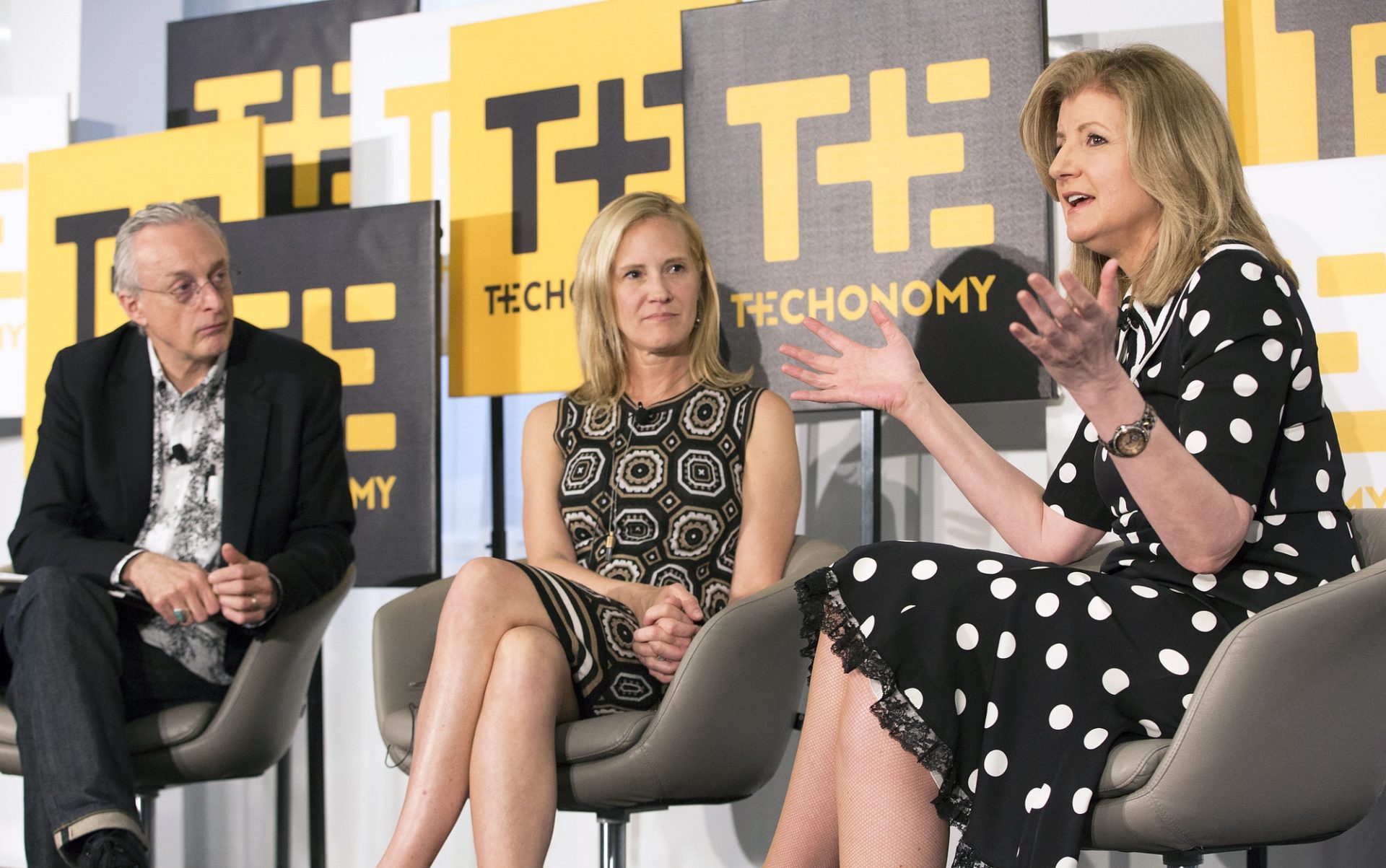
One way to improve productivity and reduce mistakes in companies—especially competitive, high-stakes organizations such as financial institutions—is to use data to prove the effectiveness of a healthy lifestyle, Arianna Huffington told David Kirkpatrick onstage at Techonomy Health in New York in mid-May. But it surprised the audience to learn that her rational, emotionally-cognizant approach to defining “health” was being applied at the kind of corporate giants people often think of as soulless behemoths.
Best known for founding the Huffington Post, Huffington’s new endeavor is Thrive Global, which works with companies to implement science-based approaches to help employees lower stress and avoid burnout. She was joined onstage by Kristin Lemkau, chief marketing officer at JPMorgan Chase, one of Thrive’s founding partners.
Lemkau said promoting wellbeing among 240,000 employees is a major organizational challenge at her company. That’s especially so in the banking industry, not “known for cultivating sleep and mental wellness,” she said. Thrive’s programs aimed to boost employees’ awareness that getting enough sleep and periodically unplugging from devices are both important components in alleviating stress and improving productivity. That began in the form of a 28-day challenge, designed as a competition in order to fit into the bank’s culture. “We honestly didn’t know how it was going to go,” Lemkau said. As it turned out, “people were really starving for it. … It became more of a community-support thing that seemed to work really well for our culture, and people loved it.”
Huffington made clear that she did not invent this approach; rather, she said, Thrive seeks to accelerate an ongoing cultural shift toward healthier, more balanced lifestyles. She said the concept was inspired in part by a meeting a few years ago in Hangzhou, China, with Alibaba founder Jack Ma. He told her that rising stress was becoming the biggest health crisis in China. That got her thinking about the far-reaching consequences of a set of issues she had already begun to address in an earlier book focusing on the need for sleep.
Thrive’s model looks familiar to those who know HuffPo. It’s part corporate programming and part media platform built on branded content and advertising. Customers so far include Accenture, Airbnb, and Uber. “We help them create the kind of culture that demonstrates through data that when employees take care of themselves, it’s better for the bottom line,” Huffington said. “We are basing everything on the latest science and the connection between wellbeing and performance.”
Lemkau said bringing Thrive in wasn’t motivated by improving the bank’s financials, but that plenty of data supports Huffington’s theory. “We ran the numbers … of what the added productivity and compensation would be,” she said, “but that was more just a wake-up call for everybody about why there was a business case.” The company plans a careful, more wide-ranging trial of Thrive’s programs at one JPMC call center. It will get access to Thrive programs so managers can see if the method reduces attrition compared to other call centers.
Huffington said participants acknowledge they are most likely to make major mistakes when they’re sleep deprived. In addition to sleep, Thrive is developing new tools to encourage people to carve out technology-free time. “One of the main next frontiers now is our relationship with technology,” she said. “What we see is happening right now is that we are all addicted to our devices and we need to set boundaries to that addiction, because otherwise we are going to sacrifice our very survival.”
Huffington at Techonomy Health: Putting JPMorgan Chase Employees to Sleep
Arianna Huffington surprised the audience at Techonomy Health in New York when she and the CMO of JPMorgan Chase explained how an emotionally-sensitive approach to defining “health” was being applied at the kind of corporate giants people often think of as soulless behemoths.

















